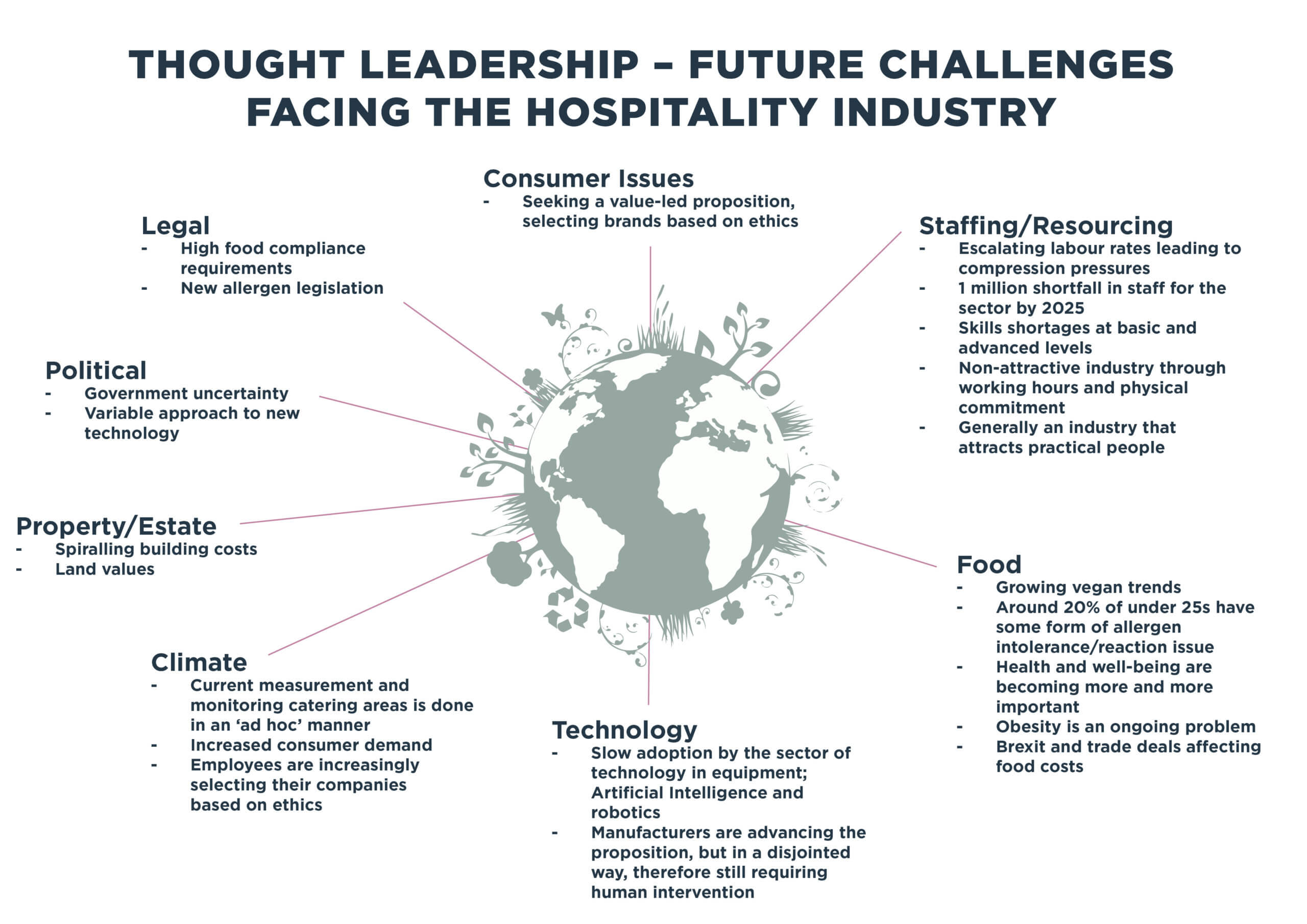Carla McKenzie’s latest article is featured in the spring edition of the Bursars Review Catering Supplement 2020, for the ISBA.
The article looks at how artificial intelligence may affect the hospitality industry amid recruitment struggles, skill shortages and emerging dietary trends and requirements.
As I sit down to write this, Boris Johnson and the Conservative Party have just secured an overwhelming victory at the polls. I suspect this will be a relief for those who work in a sector that has been sitting under the cloud of Jeremy Corbyn’s promises of putting VAT on independent school fees, and implementing a number of other initiatives which would have brought additional pressure to the sector. Boris now has a clear mandate from the country to get us out of the European Union and this is likely to happen quickly.
The hospitality industry is the fourth largest employer in the UK with 3.2 million direct and 2.8 million indirect employees. It is currently struggling to recruit and retain staff. This, combined with some of the external factors that can be seen below, is leading hospitality organisations to review their service delivery and to investigate whether they can embrace artificial intelligence to solve today’s problems and mitigate those of the future.

Naturally, those hospitality organisations with most to gain commercially from Artificial Intelligence (AI) will be among the first to use and market it. AI is the catch-all term for those technologies that mimic human intelligence and cover everything from process and form automation, through robotics, to natural language processing, predictive analytics, computer vision, machine learning and quantum-based computing – and each is a field in its own right. Customers of these technologies do not necessarily need to know how the mechanics work, but they will benefit from understanding its value and how it will drive the performance of their companies, improve their service proposition and gain or at least maintain, a competitive edge. Moving from the physical world to the digital world is critical, says David Cameron, Head of Robotics and Cognitive Automation, at Fujitsu UK:
“Companies must navigate the intelligent automation continuum between the physical world and the digital world to stay competitive and maintain growth”.
The figures regarding AI and business processes demand serious pause for thought: 20% of processes are considered suitable for automation right now, with up to 50% suitable by adding more powerful artificial intelligence and cognitive automation. This is likely to lead to a 30% reduction in demand for basic cognitive skills by 2030, and the removal of some very mundane but necessary tasks. The 30% reduction in basic skills will be countered by a 92% increase in technical skill requirements by 2030. By substituting the labour with AI it is anticipated that there will be a 60% to 80% improvement in performance when it is applied to those processes suitable for automation, so enterprises could expect a 12% to 16% reduction in operating budgets. Just as important, using AI within an operation allows access to, and assessment of, many more variants of data than the human mind could possibly be expected to process. This could help the world address some of the critical issues, such as the climate emergency, or at a more local level, support compliance reporting.
So who’s doing what? …… Hilton Hotels have teamed up with IBM’s Watson and together they have developed ‘Connie’ a robotic concierge. By all accounts ‘she’ is doing a great job in dealing with the information requirements of travellers and visitors. Hilton have also teamed up with Fujitsu and are using their smart forms to capture VIP guests’ bespoke requirements. Amazon’s voice-activated Alexa has been adopted by Marriott Hotels. Guests can now control their in-room experience, from ordering room service to dimming the lights, simply by addressing their requests to Alexa. Robotic suitcases, equipped with scanning technology, are already in use. No more carrying heavy bags to the airport!
Closer to home, robotic cleaners are being used to clean large areas of hospitals and schools. The Hawthorns preparatory school in Surrey has been trialling a robotic cleaner in its sports hall area. At £27,000 it’s a hefty investment; however, from both a qualitative and a financial perspective the payback is fast, and all the more worthwhile in a part of the country where recruiting cleaning staff is a struggle. AI is being used to remove the most laborious tasks in recruitment. People-profiling, using data gained from a great range of sources, adds extra insight that benefits job interviewing techniques and helps to better match candidates to roles. Many of the above examples are off-the-shelf solutions and there is an opportunity to partner with one of the larger development houses to solve specific issues. (Costa Coffee has done precisely that, to reduce waste in their milk ordering!)
Some readers may be looking at this and wondering how it relates to the world of independent schools, which, in the main, produce food in a very traditional and often ‘bespoke’ way. There is an opportunity to increase the use of already developed AI to combat some of the common challenges in the sector, or to seek to work in partnership with a development provider. Like anything, it’s about identifying the problem you are trying to solve, and what qualitative and financial benefits could be achieved.
The cleaning of kitchen floors is often one of the last tasks of the day and a robot already exists that could do it, reducing cost, improving quality and removing the risk of lone working. Another example of AI in action is the management of allergens and faith eating requirements, and the development of the menu engineering around them, to minimise production changes and food waste while ensuring that the food is safely delivered. In the world of healthcare this technology is already being used to create a bespoke menu list according to patients’ individual and specific dietary needs and medical advice. Patients simply scan the QR code on their table and then order digitally. The patient request is then captured securely and collated in the kitchen. Crucially, now that the data is in digital form it may be analysed and reported against.
We anticipate that AI will be increasingly used in the sector to reduce food waste and conserve energy. Training and coaching junior staff using AI and robotics will undoubtedly be with us in the near future and Amazon’s Alexa is already fulfilling some of this role. Organisations will be able to forecast using a variety of data sources to establish with accuracy the likely uptake of food and improve supplier management and the accuracy of ordering. The sharing of data across platforms will also enable transparent access by the community to information such as the detailed nutrient content and consumption analysis by individual customer.
The equipment manufacturers are also developing AI and this will transform the way we cook and the skills required to do it. While early adopters of AI stride ahead and demonstrate the tangible benefits of doing so, it is only a matter of time before the technology is widely available in the sector and able to deliver additional value. If you are planning the kitchen or catering department of the future for your school, make space for the robots – they are coming!
For more information, visit the MYA website: www.mya-consulting.co.uk
